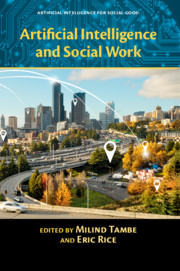Artificial Intelligence and Social Work Artificial Intelligence for Social Good Series
Coordonnateurs : Tambe Milind, Rice Eric

Eric Rice is Associate Professor and Founding Co-Director of the Center for Artificial Intelligence in Society at the University of Southern California. An expert in community-based research and social network science and theory, he has spent the past several years working to merge social work science and AI to create solutions for major social problems such as homelessness and HIV. Since 2002, he has worked closely with homeless youth providers in Los Angeles and many other communities across the country to develop novel solutions to support young people across the nation who do not have a home, with the goal of ending youth homelessness.
Date de parution : 02-2021
Ouvrage de 267 p.
15.2x22.9 cm
Disponible chez l'éditeur (délai d'approvisionnement : 14 jours).
Prix indicatif 39,35 €
Ajouter au panierDate de parution : 11-2018
Ouvrage de 266 p.
15.7x23.5 cm
Disponible chez l'éditeur (délai d'approvisionnement : 14 jours).
Prix indicatif 135,14 €
Ajouter au panier